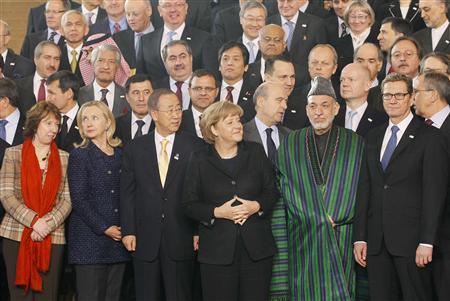
From Missy Ryan and David Brunnstrom, Reuters: The West used an Afghanistan meeting on Monday to signal enduring support for Kabul as allied troops go home, but economic turbulence in Europe and crises with Pakistan and Iran could stir doubts about Western resolve.
The goal is to leave behind an Afghan government strong enough to escape the fate of its Soviet-era predecessor, which collapsed in 1992 in a civil war. The country’s allies are preparing increasingly for a scenario in which there is no peace settlement with the Taliban before most foreign combat troops leave in 2014.
"The United States intends to stay the course with our friends in Afghanistan," Secretary of State Hillary Clinton told the conference. "We will be there with you as you make the hard decisions that are necessary for your future."
She said the entire region had "much to lose if the country again becomes a source of terrorism and instability."
Hosts Germany sought to signal Western staying power in the country, a haven for al Qaeda’s leadership in the years before the September 11 attacks, at the gathering of dozens of foreign ministers in the German city of Bonn.
"We send a clear message to the people of Afghanistan: We will not leave you on your own. We will not leave you in the lurch," said German Foreign Minister Guido Westerwelle. . . .
In a rare positive development, Clinton said the United States would resume paying into a World Bank-administered Reconstruction Trust Fund for Afghanistan, a decision that U.S. officials said would allow for the disbursement of roughly $650 million to $700 million in suspended U.S. aid.
The United States and other big donors stopped paying into the fund in June, when the International Monetary Fund suspended its program with Afghanistan because of concerns about Afghanistan’s troubled Kabul Bank.
The conference is not expected to produce new aid pledges; instead, U.S. officials say they hope it will mark a start to a process outlining future support to be pledged by mid-2012.
A European diplomat said his best estimate was that Afghanistan would need about $4 billion a year to fund its army and police "but it could be anywhere between 3 and 6 billion of which 1/3 would come from the Americans and the rest — 2/3 — would have to be pooled." (photo: Wolfgang Rattay/Reuters)
Image: reuters%2012%205%2011%20Bonn%20conference.jpg
